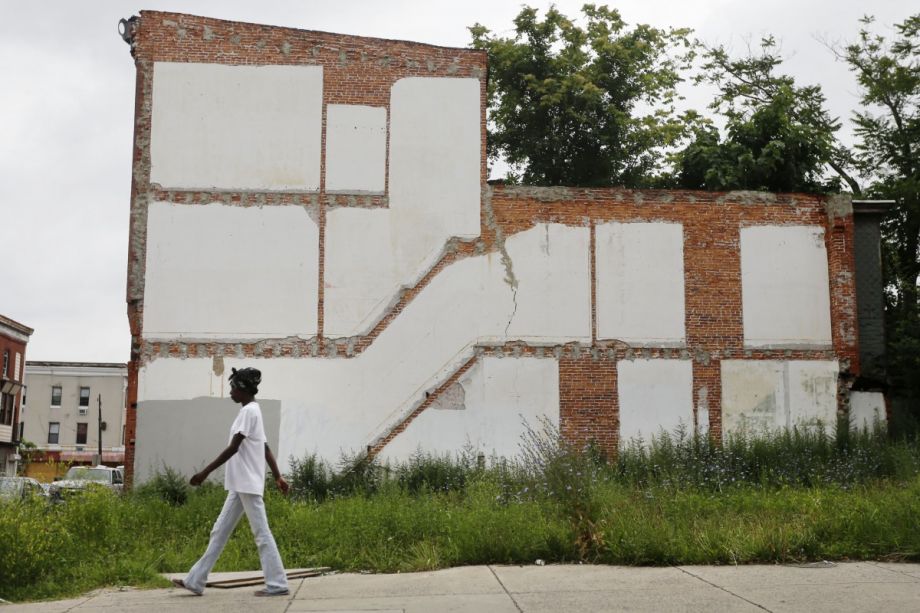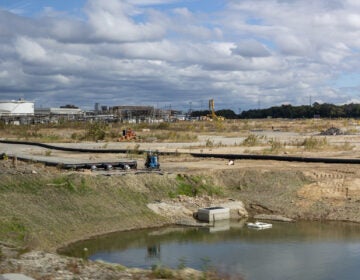Philly’s 43,000 vacant lots face a fresh political battle

The Philadelphia Land Bank is the latest battleground in the war for position between City Council and the Kenney administration.
At the first council meeting of 2018 held on Thursday, Council President Darrell Clarke pushed to put reform of the four-year-old public agency on the ballot this November. If successful, the changes could allow the land bank to more easily acquire the vacant, tax-delinquent properties it needs to advance its mission of putting a portion of the city’s 43,000 vacant lots back to productive use but, in the process, limit a source of short-term public revenue.
“It’s competing missions,” said Clarke. “The Revenue Department’s mission is to take every property to sheriff sale that it can. Our mission is to rebuild communities. We are head-butting and, at some point, there needs to be a tiebreaker.”
Clarke’s reform would allow the council to set “the form, substance, and timing” of land bank payments to the city for liens and other fees on vacant land that it is trying to acquire. Presumably, the council would allow the land bank to waive city liens so to make it faster and simpler for the agency to take over vacant property. Observers doubt they would waive back taxes owed to the school district.
In a memo (PDF) circulated on Monday, Clarke denounced the performance of the four-year-old land bank. Only 66 properties have been obtained using the institution’s “special powers” to acquire vacant tax-delinquent properties, the memo noted.
“Land Banks established in Pennsylvania counties like Westmoreland and Lackawanna have acquired more properties than Philadelphia,” Clarke’s memo reads. “The administration has chosen to prioritize selling vacant land, especially vacant land in gentrifying neighborhoods, through sheriff’s sale rather than placing these properties in the Land Bank and using them to support equitable development.”
It’s easy to see why Kenney administration officials may choose to sell tax-delinquent parcels at sheriff’s sales instead of transferring them to the land bank: fast cash. Selling a vacant piece of land generates a quick, one-time profit while a transfer of the land bank comes with no guarantees.
“There’s been a big push from the administration to look at tax delinquent properties as a vehicle to get more revenue,” says Rick Sauer, the executive director of the Philadelphia Association of Community Development Corporations, and a member of the land bank’s board. “It’s a tradeoff between short-term revenue collection and long-term community development.”
Clarke —who was initially skeptical about the need for a land bank but ultimately co-sponsored the 2014 legislation creating the new agency — says the current operating system isn’t working as the law intended. He argues that the process as it stands handicaps the land bank as it tries to move forward with plans to assemble land for affordable housing and other development that could help the city address concerns over rising inequality.
“We have situations where the land bank has requested properties as part of an equitable development scenario,” says Clarke. “But the Revenue Department took the properties to sheriff sale, sold them, and they are now market rate houses on one of the blocks in my district.”
Clarke’s anecdote exemplifies a chain of events the land bank is intended to prevent. When she first proposed the legislation, Councilwoman Maria Quiñones-Sánchez hoped that the institution would be able to consolidate Philly’s publicly held vacant land under one roof, making it easier to assemble property that could be developed by public agencies or sold to a developer for a project that the city wants to see move forward.
The Kenney administration is pushing back on Clarke’s bill. City spokesman Mike Dunn points out that the Land Bank controls almost 2,000 properties, most of them shifted into its holdings by other public entities like the Philadelphia Redevelopment Authority. The 66 properties mentioned by Clarke came in during the last four months, after Land Bank Executive Director Angel Rodriguez joined the agency in September, according to Dunn.
“The goal of the Land Bank is not to own the most properties, the goal is to facilitate the return of blighted properties to uses that make our neighborhoods better,” wrote Dunn in an email. “Claiming that the Land Bank is underperforming by not acquiring properties for which it is not poised to return to productive use and assigning blame to the Department of Revenue does a disservice to both these agencies.”
Others say that a myriad of issues continue to confound the young agency and that Clarke’s focus on clashes with the Revenue Department elides deeper problems.
In this telling, land acquisition isn’t the primary challenge stymying the land bank. Staffing and leadership have proven difficult as union negotiations and a slow hiring process left the new agency handicapped over much of its first four years. The process of getting the city’s older land-holding bureaucracies to take the newcomer seriously has been long and painful as well.
Meanwhile, City Council exerts a lot of control over the institution because of political traditions that discourage land use decisions to be made without the approval of the district member and because of regulations that require council members to approve the sale of land bank holdings. Clarke’s proposed ordinance could result in more power over the land bank going to the Council, these critics say.
Editors Note: This article was updated on Jan. 30, 2018 to clarify Council President Darrell Clarke’s historic positions on the land bank.
WHYY is your source for fact-based, in-depth journalism and information. As a nonprofit organization, we rely on financial support from readers like you. Please give today.







